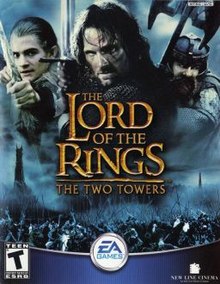| The Lord of the Rings: The Two Towers | |
|---|---|
 | |
| Developer(s) | Stormfront Studios Hypnos Entertainment (GC, Xbox) |
| Publisher(s) | Electronic Arts[a] |
| Director(s) | Hudson Piehl |
| Producer(s) |
|
| Designer(s) |
|
| Programmer(s) | Steve W. Kojder |
| Artist(s) |
|
| Writer(s) |
|
| Composer(s) | Howard Shore |
| Platform(s) | |
| Release | |
| Genre(s) | Action, hack and slash |
| Mode(s) | Single-player, co-op multiplayer[b] |
The Lord of the Rings: The Two Towers is a 2002 action hack and slash video game developed by Stormfront Studios for the PlayStation 2 and Xbox. A 2D Game Boy Advance game of the same name was made by Griptonite Games, a port to the GameCube by Hypnos Entertainment, and to mobile by JAMDAT. A version for Microsoft Windows developed by Ritual Entertainment was cancelled during development. The game was published on all platforms by Electronic Arts. It is an adaption of the 2002 film of the same name. Originally released in North America for the PlayStation 2 in October 2002, it was released in November 2002 for the Game Boy Advance, in December 2002 for the Xbox and GameCube, and in May 2003 for mobile.
The game is an adaptation of Peter Jackson's 2001 film The Lord of the Rings: The Fellowship of the Ring and his 2002 film The Lord of the Rings: The Two Towers, which was released shortly after the game. As it is not an adaptation of J. R. R. Tolkien's The Two Towers, the second volume in his Lord of the Rings novel, anything from the novel not specifically mentioned or depicted in the films could not be represented in the game. This is because, at the time, Vivendi Universal Games, in partnership with Tolkien Enterprises, held the rights to the video game adaptations of Tolkien's literary works, whilst Electronic Arts held the rights to the video game adaptations of the New Line Cinema films.[6] EA chose not to publish a game based on Jackson's The Fellowship of the Ring film, instead incorporating some of the plot and footage into their The Two Towers game, which was released a few weeks after Vivendi's The Fellowship of the Ring game, a licensed adaptation of Tolkien's novel The Fellowship of the Ring.
The Two Towers received a generally positive response, with critics praising the re-creation of sets and scenes from the films, and the epic scope of some of the battles. Some, however, criticized the game for being too short and the combat overly repetitive. The game was a financial success, selling almost four million units, and outselling Vivendi's The Fellowship of the Ring game, which sold just over one million. In November 2003, EA released a sequel based upon the third film, The Lord of the Rings: The Return of the King.
- ^ a b c "The Lord of the Rings: The Two Towers". Eurogamer. Archived from the original on March 4, 2016. Retrieved November 5, 2014.
- ^ "The Lord of the Rings: The Two Towers (PS2)". GameSpy. Archived from the original on October 7, 2013. Retrieved November 5, 2014.
- ^ "The Lord of the Rings: The Two Towers (GBA)". GameSpy. Archived from the original on August 20, 2007. Retrieved November 5, 2014.
- ^ IGN (December 11, 2002). "Two Towers, Three Systems". IGN. Archived from the original on May 6, 2023. Retrieved May 6, 2023.
- ^ "The Lord of the Rings: The Two Towers (Wireless)". GameSpy. Archived from the original on August 8, 2010. Retrieved November 5, 2014.
- ^ "Lord of the Games". IGN. December 2, 2002. Archived from the original on January 25, 2021. Retrieved October 27, 2014.
Cite error: There are <ref group=lower-alpha> tags or {{efn}} templates on this page, but the references will not show without a {{reflist|group=lower-alpha}} template or {{notelist}} template (see the help page).